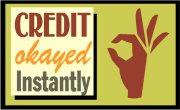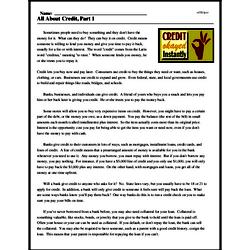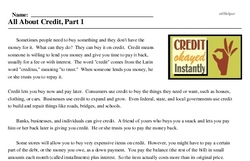All About Credit, Part 1
Sometimes people need to buy something and they don't have the money for it. What can they do? They can buy it on credit. Credit means someone is willing to lend you money and give you time to pay it back, usually for a fee or with interest. The word "credit" comes from the Latin word "creditus," meaning "to trust." When someone lends you money, he or she trusts you to repay it.
Credit lets you buy now and pay later. Consumers use credit to buy the things they need or want, such as houses, clothing, or cars. Businesses use credit to expand and grow. Even federal, state, and local governments use credit to build and repair things like roads, bridges, and schools.
Banks, businesses, and individuals can give credit. A friend of yours who buys you a snack and lets you pay him or her back later is giving you credit. He or she trusts you to pay the money back.
Some stores will allow you to buy very expensive items on credit. However, you might have to pay a certain part of the debt, or the money you owe, as a down payment. You pay the balance (the rest of the bill) in small amounts each month (called installments) plus interest. So the item actually costs more than its original price. Interest is the opportunity cost you pay for being able to get the item you want or need now, even if you don't have the money to pay with cash.
Banks give credit to their customers in lots of ways, such as mortgages, installment loans, credit cards, and lines of credit. A line of credit means that a prearranged amount of money is available for you in the bank whenever you need to use it. Any money you borrow, you must repay with interest. But if you don't borrow any money, you pay nothing. For instance, if you have a $5,000 line of credit and you only use $1,000, you will only have to pay back the $1,000 plus any interest. On the other hand, with mortgages and loans, you get all of the money at one time upfront.



